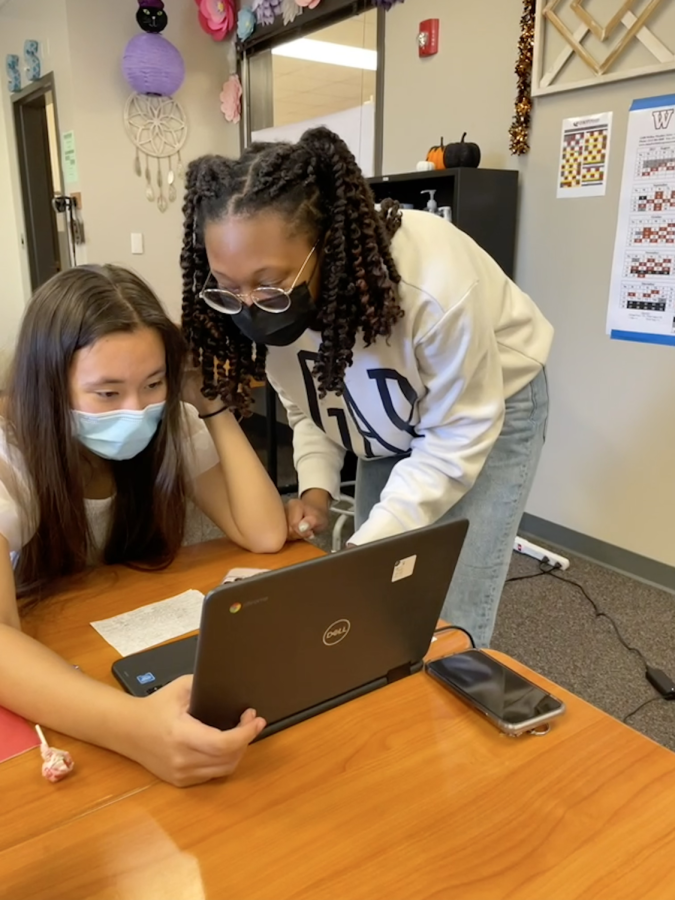Chromebooks at Westwood Have Eased the Learning Process
Susan Hamilton ’23 and Trinity Woods ’23 work together on their Chromebook. Photo courtesy of Aanika Hirode.
October 18, 2021
Over the past year, Chromebooks have become a controversial emblem of the virtual education era. In 2020, when all students were learning remotely, a 1 to 1 Chromebook program was implemented across RRISD, providing new model Chromebooks for all students for take-home use. Additionally, students taking any standardized tests at the end of the year were required to use their district-issued Chromebook to complete them. This program was extended during the 2021 to 2022 school year when in-person learning began, requiring students to bring their Chromebooks to school each day.
I used my personal computer to partake in virtual learning for the entirety of last year. However, in mid-December, I picked up a district-issued Chromebook to take the January PSAT, an End of Course exam, and my Advanced Placement exams. While I didn’t use the Chromebook outside of these tests, I recognized how useful they were in streamlining the technology across the district. I realized that it was a privilege for me to have access to a functioning personal computer, and I appreciated the district’s efforts to make sure everyone had access to the technology they needed. Additionally, while AP exams were going on, I heard many stories about people from schools across the country whose scores got canceled because they mistakenly left other applications open on their computers. This wasn’t a possibility on the Chromebooks since the College Board app had to be accessed without logging into the device. I was grateful to have one less thing to worry about during that stressful time.
As we came back into in-person learning this year, I and many other students were conflicted about whether we should use our personal computers or the district-issued Chromebooks. Our personal computers were often faster, more portable, and customized to our individual wants and needs. However, the Chromebooks were more streamlined with the district, students were required to take specific tests with them, and they were able to be repaired by technical support if there was an issue with them. I chose to use my Chromebook at school for two reasons: I was scared to bring my Macbook and risk something happening to it, and I liked the idea of keeping my schoolwork separate from my personal work. Overall, I haven’t regretted my decision. The Chromebook has a touch screen, which is nice for doing things quickly and efficiently. The battery life isn’t great, but it’s honestly better than the battery life on my Macbook. If I charge it fully on Sunday night, it will typically last me for my Monday and Tuesday classes as long as we don’t use them too much. In addition, the Chromebooks are very durable and can survive the constant jostling in my backpack without being damaged. However, I’ve heard complaints from my fellow students about the Chromebooks, and I can’t say they aren’t warranted. They are extremely slow at times, and they take a long time to connect to the WiFi (which has to be done every time you open it). However, in terms of internet capabilities, the district restrictions are applied to the WiFi, as opposed to the individual computers, so you would be filtered no matter what computer you use. They are also extremely bulky, and my backpack is significantly heavier when I have my Chromebook in my bag. Overall, though, the convenience of having a separate device for school has outweighed the negative aspects for me.
So why did the district choose to provide Chromebooks for their students over any other computer? Over the past year, I’ve noticed that even kids in other states have been provided Chromebooks. Google’s Product Manager for Chromebooks, Rajen Sheth, shared that 27,000 students across hundreds of school districts are now using these devices. Sheth also noted that they are used in 41 states, and these distributions will be the first of many. The main reason is simply that Chromebooks are relatively inexpensive and easy to operate and maintain. With this in mind, it makes sense that they would be the computer of choice for mass distribution to students.
Overall, I and many other students appreciate the district’s continued efforts to make technology use more equitable. Transitioning back to in-person schooling has been a difficult adjustment for everyone, and it’s crucial that everyone has equal opportunities to succeed now and in the future.



